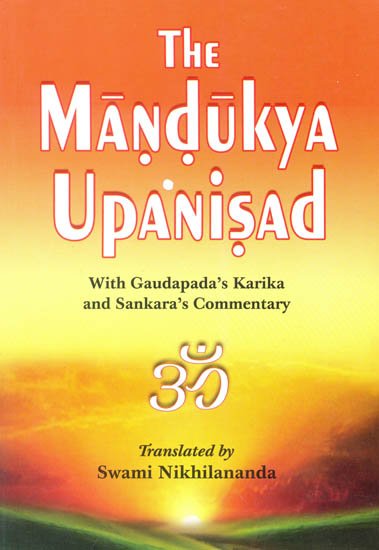Mandukya Upanishad (Gaudapa Karika and Shankara Bhashya)
by Swami Nikhilananda | 1949 | 115,575 words | ISBN-13: 9788175050228
This is verse 4.57 of the Mandukya Karika English translation, including commentaries by Gaudapada (Karika), Shankara (Bhashya) and a glossary by Anandagiri (Tika). Alternate transliteration: Māṇḍūkya-upaniṣad 4.57, Gauḍapāda Kārikā, Śaṅkara Bhāṣya, Ānandagiri Ṭīkā.
Mandukya Karika, verse 4.57
Sanskrit text, IAST transliteration and English translation
संवृत्या जायते सर्वं शाश्वतं नास्ति तेन वै ।
सद्भावेन ह्यजं सर्वमुच्छेदस्तेन नास्ति वै ॥ ५७ ॥saṃvṛtyā jāyate sarvaṃ śāśvataṃ nāsti tena vai |
sadbhāvena hyajaṃ sarvamucchedastena nāsti vai || 57 ||57. All this is seen to be born on account of the illusion of experience (due to Avidyā); therefore nothing is permanent. Ally again, as one with the Ultimate Reality is unborn. And therefore there is nothing like destruction.
Shankara Bhashya (commentary)
(Objection)—Nothing else verily exists except the unborn Ātman. Then how can you speak of the origin and destruction of the cause and the effect as well as of (the chain of birth and death constituting) the world?
(Reply)—Listen. The word Saṃvṛti in the text signifies the (illusory) experiences of the empirical world which are caused by ignorance. All this is born of this power of ignorance which brings into existence the illusory experiences of the world. For this reason, nothing is permanent in the realm of ignorance. Therefore it is said that the world, having the characteristics of origination and destruction, is spread before us (i.e., the ignorant persons). But as one with the Ultimate Reality, all this is nothing but the unborn Ātman. Therefore, in the absence of birth, there cannot be any destruction, viz., the destruction of cause or effect.
Anandagiri Tika (glossary)
The opponent contends that if nothing but birthless and nondual Ātman exists, then the statements regarding the origin and the destruction of the universe as stated in the previous Kārikā become irrelevant and contradictory. The reply is that there is no contradiction as the two statements are made from two different standpoints. From the standpoint of the Ultimate Reality there is neither birth nor death. But from the relative standpoint, which conjures up before, our vision the world of name and form, there are birth and death. Imagine a rope lying on the road. The wise man knows it as the rope alone. But the deluded person sees it as the snake and being afraid of it, takes to his heels in spite of the assurance of the wise man that it is the rope and not the snake. Now the rope and the snake are both facts from the two standpoints. The wise man sees the rope and the ignorant person sees the snake. Therefore the statement of the ignorant man does not contradict the statement of the wise one.
The ideas of birth and death are possible only from the relative standpoint. The wise man sees everything as the non-dual Ātman. Therefore he cannot see the possibility of destruction of anything. Comp. Kārikā 1.17 and 1, 18.
